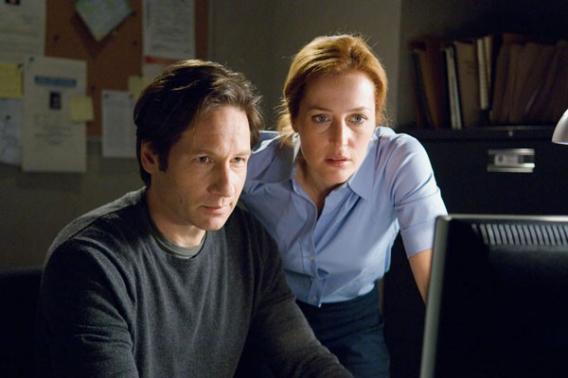Summer is here, the perfect time to catch up with a few of those shows everyone is always saying you should watch. But there are so many! How can you decide which to try? You need to find the gateway episode, one you can watch without any background knowledge and which will give you a real sense of the show—and whether you’ll like it.
Every Friday (and later, Sunday) during my adolescence, I watched The X-Files with my dad, like it was church. But despite my adolescent devotion, I was worried that the show would feel dated today. The X-Files is a key ’90s predecessor for the modern procedural, a form that has long since passed market saturation. Would the things that felt groundbreaking then now read as cliché?
I have good news: The show, as a whole, holds up to the scrutiny of time. And it’s ripe for an educated session of binge-watching.
Even if you’re entirely new to the series, you’ll recognize the familiar set-up right away. Agent Fox Mulder (David Duchovny), a pouty rebel, is the Don Quixote of the FBI, stuck in the basement of a government complex endlessly investigating cases that might have something to do with unexplained phenomena. In the bureau’s dusty file cabinets, he’s looking for aliens—and, also, for his missing sister, Samantha, whom he believes was abducted. Enter Agent Dana Scully (Gillian Anderson), a grumpy skeptic, sent to Mulder’s lair to bring him back to the institutional fold. Of course, the reverse begins to happen, and the two agents become an unlikely team against the world.
The series splits rather cleanly into “monster of the week” and “mythology” episodes, with the latter exploring an ever unfolding plot involving a deep government conspiracy, complete with a group of old men in a smoky room. Some of the series’ best episodes come out of the early “mythology” plotline, but it makes the most sense to start with a stand-alone. The likely masterpiece of the entire X-Files run—all nine seasons and two films of it—is “Clyde Bruckman’s Final Repose.” Written by Darin Morgan, it’s dark in the way a sci-fi series should be, and funny, too. But I don’t like eating my dessert first, and so, for me, “Bruckman” isn’t a suitable starter. Instead, I’d recommend “Pusher,” from Vince Gilligan, who went on to create Breaking Bad. (Gilligan wrote many of the best X-Files episodes.)

FOX
The “Pusher” is Robert Patrick Modell (Robert Wisden), who seems to have the ability to talk his victims into harming or killing themselves. After making a decent living as a contract killer, Pusher starts looking for a worthy opponent. His current foe, Agent Burst (“You got the greatest name,” Pusher tells him, in a fairly obvious bit of foreshadowing), has begun to bore him. So Modell settles on Mulder, and the cat-and-mouse game begins. As with many great episodes of The X-Files, the biggest reveals aren’t necessarily supernatural. Pusher, who behaves with all the pathological glee of the best/worst serial killers, comes to seem more and more normal as the secret behind his abilities is revealed. The episode, nestled in a series where the spectacular and the ineffable seem to pop up everywhere, is actually a meditation on being ordinary.
And here’s where The X-Files remains, in some ways, ahead of its time, even now. Despite the central mythology’s very bad men planning very bad things, the show focuses on an idea of evil as essentially banal, accessible, part of our everyday world. Pusher, like many of the best X-Files foes, isn’t necessarily a “bad” person. Without giving away too much, I’ll say that he made a choice to be who he is, and that the deciding factor was more innocent than one initially suspects. The consequences, too, are surprising. They play out in a dramatic scene of Russian roulette—a scene that shows Agent Scully (who, sadly, isn’t quite as central to “Pusher” as she is to other episodes) at her best. She’s more than a sidekick or a foil to Mulder’s antihero. While Mulder and Pusher become entrenched in their own chase, her skepticism helps her see though the set dressings and locker-room competitions around her.
When I watched The X-Files as a teenager, I wanted to be Agent Scully, a forensic pathologist who defied the female stereotypes on television. And I wasn’t sure, to paraphrase Emma Barrie, whether I wanted to marry Agent Mulder, the truth-seeking iconoclast, or become him. Pusher, like the teenaged version of me, desperately wanted to assume the identity of an ideal type in order to be seen as “special.” It’s a testament to the show that, even without feeding that adolescent yearning to become something, anything, more interesting than what I was, I’m still compelled to watch, riveted by the story.
Previous Gateway Episodes
The Sopranos
Gilmore Girls
Veronica Mars
Deadwood
Doctor Who
Buffy the Vampire Slayer
